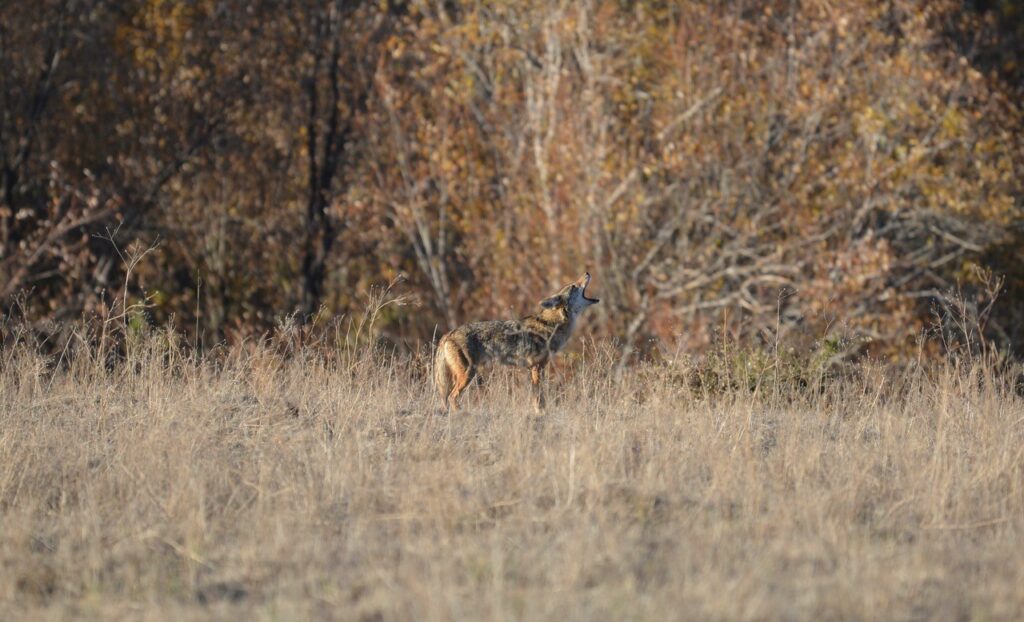A Coyote howls in the San Francisquito Flats. Photo by Abby Cole.

What to Do if You Find Injured Wildlife on The Preserve
August 24, 2022
By Alix Soliman, Communications & Outreach Coordinator
The Preserve is located at the wildland-urban interface (WUI), a place where human communities intersect with a rugged, natural landscape home to an abundance of wildlife. Living in such an environment means that folks encounter wild animals more frequently than city-dwellers, and unfortunately, sometimes these animals are found injured, sick, or orphaned.
While the Conservancy has a vested interest in the health of Preserve wildlife, we are not a rescue or rehabilitation center and defer to qualified professionals to care for injured animals found on The Preserve. Here are a few guidelines that will help you take appropriate action should you come across a wild animal in distress.
Assess the Situation
First, assess whether the animal needs professional assistance. If you come across a lone fawn in the grass, for instance, we advise you to leave it be unless it appears injured or panicked. Fawns can be left alone for up to 24 hours for the first several weeks of their life and are hardwired to stay still while their mother is away foraging. Similarly, some species of birds will still feed and attend their babies after fledging, so if you find a baby bird hopping about on the ground and crying, it’s best to keep your distance and observe from afar whether a parent is near before calling it in.
If a bird or bat flies into your house, shut off all interior lights, open all doors and windows, and turn on the outdoor lights. In most cases, the animal will exit without any additional assistance. If a bird strikes your window, set it in a shaded spot and stay to monitor it for up to an hour to see if it will awaken and fly away before you call a wildlife rehabilitator.
Determine Who to Call
Second, determine who to call if the animal does need help. This will largely depend the species and the type of injury. In most cases, you’ll call the SPCA of Monterey County. Their wildlife rescue and rehabilitation center handles injured, sick, and orphaned hawks, owls, deer, raccoons, bobcats, coyotes, foxes, songbirds, hummingbirds, opossums, squirrels, rabbits, skunks, bats, and more. If you have a wildlife emergency during SPCA office hours (8am – 5pm as of this writing), call them at (831) 264-5427.
If you find a large predator injured on The Preserve, please keep a safe distance and call the Conservancy first. Game species including turkey, quail, and pig are overseen by California Department of Fish and Wildlife (CDFW), which will direct you to contact someone from this list of permitted wildlife rehabilitation facilities based on the species and location. Please note that most wildlife rehabilitators will rely on you to transport the animal to them. If you are frightened or unable to do so, the Conservancy is happy to assist.
If an animal is entangled or trapped in a pond, pool, construction fencing, or any other man-made obstacle on The Preserve, please immediately contact the Conservancy. Trapped animals are frightened, making them more dangerous to handle. If possible, carefully place a towel or sheet over its head to cover its eyes. This will calm the animal so it doesn’t become further injured while you wait for help to arrive.
If you find the animal after typical work hours, SPCA provides species-specific recommendations for keeping the animal as safe and comfortable as possible until a qualified professional is available to assist. It is important to always use your best judgment to minimize the risk of bites, scratches, or disease transmission when attempting to help. As such, the Conservancy does not recommend handling wildlife directly unless given specific guidance to do so.
Dead Animals
If you find a predator (bird of prey, bobcat, coyote, mountain lion, bear, etc.) that is deceased, please notify the Conservancy. We may pick up the carcass and, if appropriate, send it to the Wildlife Diagnostics Lab in Davis, California to test for rodenticides and viruses.
For non-predators, please call Preserve security to move the carcass from the roadside so it does not attract scavengers that would increase the risk of another collision.